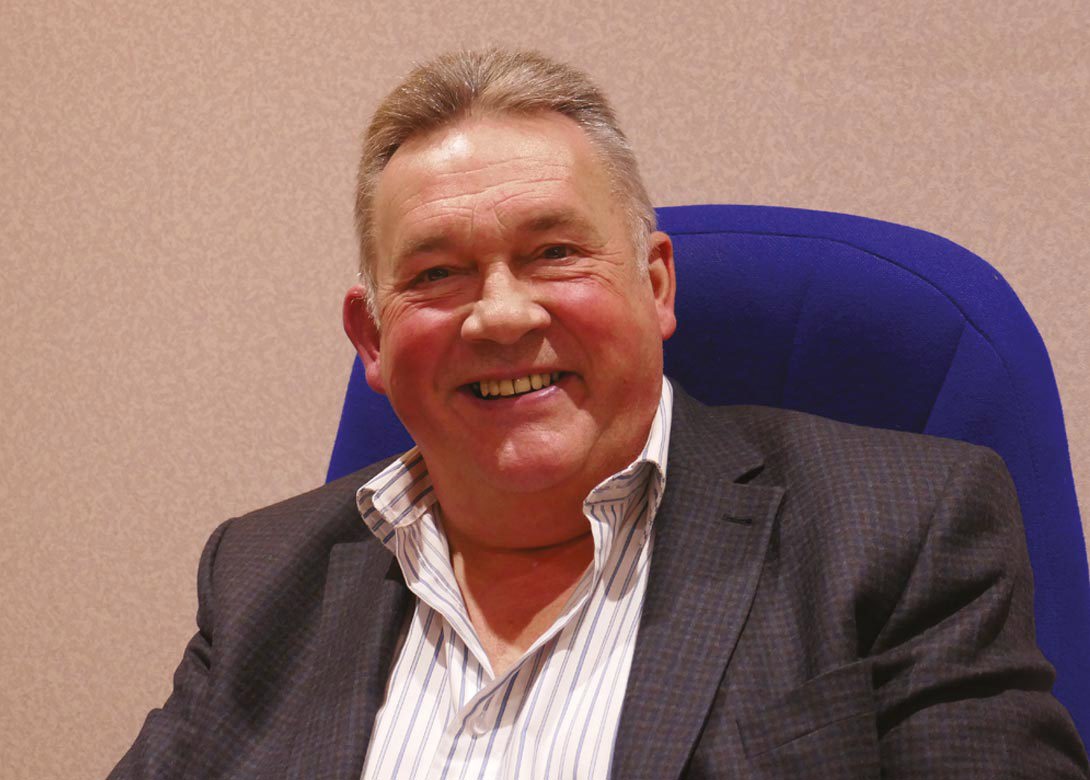
BIAFD’s new chairman is the first owner of an independent UK fastener distribution business to hold the position in fifteen years. Guy Stanhope, managing director of Phil Holden Fasteners Ltd, talks about his fastener background and BIAFD.
Guy Stanhope has only ever had two jobs. “I left school at sixteen with very little in the way of qualifications. I had a Saturday job at the local Co-op. Unbeknown to me, the personnel manager had seen something in me and decided to offer me a full-time job.”
“I knew I didn’t want to go into a factory and work on a lathe. I enjoyed the contact with people, so I said ‘fantastic’. Then he pulled out my school report, and said, ‘mind you, we’re going to have to do a little bit better than this’.”
The prospect of going back to school “went down like a lead balloon”. Three years of part time study “was a slog”. However, it worked. Guy progressed to become the youngest store manager in the Leicestershire Co-op.
“As ever, things change.” A new management regime that Guy “simply didn’t get on with”. The economy was tough and it didn’t take long to “realise how hard it was to get another job”. After six months trying, two interviews offered the hope of joining “a sock manufacturer in Leicester or an umbrella manufacturer in Liverpool”.
Fate, or more precisely Guy’s mother, intervened. “She knew Phil Holden, who’d literally been going for no more than two years. I didn’t warm to him straight away, and what he could offer was nowhere near what I was earning at the Co-op, but … I just saw something. Two days later I’d been offered both the other jobs – which I had to decline because I am what I am, and I’d said yes to Philip.”

“We had a card sales reporting system. The previous guy had been very, very good at filling these cards in but no good at actually knocking on the doors. I wasn’t very good at reporting, but I knocked on lots of doors.”
“Three months – and nothing, not one order, but time in the warehouse had taught me about the products. So, I started to learn, and I started to get used to rejection.”
Eventually, the first order came – worth GB£26. It went from there. “The management skills from the Co-op – understanding just in time, shelf-stacking, hot-spot-ends – meant PHF went down the road of Kanban systems very early on.”
The first success nearly backfired massively. “We started with one huge system – literally emptying the stores and went to nine separate stations on the production line.”
“Second day, they’d run out! The MD is demanding to know what hell is going on. In disbelief I just had to say: ‘To be honest I can’t tell you’.” The customer had provided all the fastener demand for production and PHF had put in a month’s stock cover, checked every other day. “At which point, with eight people looking daggers at me, a little man in a red overall with a trolley comes puttering along and starts helping himself to the contents of the bins and putting them in bags.”
“So I said: ‘Can I just ask a question – What’s he doing?’ The MD doesn’t say a dicky bird but one of the others says: ‘Harry what are you doing?’ And Harry says: ‘I’m picking my spares order’. ‘Spares?’ I say. ‘Nobody said anything about spares!’ And Harry said: ‘Where else am I going to get them from?’ – a perfectly reasonable question, because there were none left in the stores.”
“It still took three months to get it to how it should be but once we got it, we were there. The thing we learnt was to engage with everybody before you do it – however small it is, listen.”
Another sizeable Kanban contract and the business really started to grow. “We went from eight people, to ten, then to twenty and we relocated until we arrived in the unit we are in now, which has to be twenty years ago.” That was when Guy was appointed sales director. “I am sure Philip won’t mind me saying so – I effectively ran the business until over the last seven or eight years he came in on a Monday and that was it. It was his decision to offer the business to me last year. I put together the best deal I could, and it went through.”
“Do I enjoy it? Absolutely. Do I think it is a good business? Absolutely. A brilliant business – because of the cracking people we’ve got out there. We have deliberately invested in people and we get back in spades the trust we invest.”
“There’s no point in trying to pass the buck with an email. That achieves nothing, because there hasn’t been a resolution. Pick up the phone, find out what is going on, go and see them. Nothing better than meeting people – you’re there, you’re learning things.”
“My background has always been service based, doing the right thing by our customers. We earn the right to serve and the customer is king, regardless of what ridiculous things they might ask for. If they are stuck, if it matters to them, however small, we’ll find a solution. Lose sight of that and someone will eventually take that business off you.”
“Twenty years ago, I felt we couldn’t sustain and grow on nuts and bolts alone, so we started looking at add-on value. If it is a relatively low value but critical item, it needs to be managed, efficiently. We proved we could do that, so the customer didn’t have to worry. We diversified and to this day continue to do so.”
PHF has also “gone into kitting in a big way, which has proven very fruitful. Again, the principle is about solving a problem. We’ve listened to what the customer wants, and we’ve done it”.
“Where are we going? More of the same. Offering a better service than some of our bigger competitors. On the other hand, we can walk away from things if we want to – it has to be a deal that is good for everybody, that will last.”
“We have challenges like everybody else. BREXIT is the hot potato right now. In a few years’ time it’ll be something else – and we will manage, we will do what we have to do.”
Today, PHF employs fifty people and over the last two years has achieved growth far beyond the market average. Primarily servicing the UK, PHF’s strength with key customers has meant an expanding geographic coverage. Guy Stanhope’s solution has been to forge sustainable partnerships with other independent fastener businesses to ensure the PHF customer continues to receive exemplary service.

A decade of BIAFD membership has played its role in that. “BIAFD has got better over the years – and the trust between people within the association has grown.”
“I’d been to a meeting a long time ago, when it was at its lowest ebb, and I didn’t enjoy it. Graham Joyce persuaded me to come along again and, I have to say, it was completely different. There were people genuinely trying to make BIAFD a recognised organisation with a bit of clout.”
“It was going the right way before, but the anti-dumping situation was definitely a catalyst. What BIAFD was doing got round the industry, and new people appeared at the meetings. It’s about a common problem bringing people together.”
“It still feels a bit too heavily focused on the wholesalers rather than the end user distributors but that is improving. People like me have a job to do to sell it to other companies like ourselves.”
“We’ve got some teeth now, we can rattle a few cages. If you belong to a body, it’ll go into bat for you. Membership also demonstrates you’re not just some mickey mouse outfit.”
“The main thrust is that people can talk about common issues and solutions. You can help each other without being anti-competitive. If we come up against a BIAFD member in the market we’ll still be measured on our own merits, our own service capabilities, the value for money we deliver.”
“Membership represents great value for money. Being a founder member of EFDA gives the chance to go to European meetings, see how people in other markets do things. That could well become more critical – EFDA is a European not an EU organisation so BIAFD still has a major role to play in its future.”
“Now we’re starting to address the skills gaps in our industry – finding ways to support and recognise people’s development. That is something BIAFD is well positioned to do.”
“In our business, sometimes it is as simple as the customer just needs help. Same principle in BIAFD. We listen, we learn – if we don’t have the answer, we go find it.”
“For me it’s a no-brainer – well worth every penny. I would not have become chairman if I did not wholeheartedly believe in it – I have enough on my plate. It really is worth having a go.”

Having held senior management roles in leading automotive and fastener businesses, Phil joined Fastener + Fixing Magazine as editor in 2002. Convinced there is no substitute for ‘being there’, over 17 years of visits and interviews around the world means he has accumulated an extraordinary knowledge and perspective of the global fastener industry, reflected in his incisive and thought provoking reporting.
Don't have an account? Sign Up
Signing up to Fastener + Fixing Magazine enables you to manage your account details.